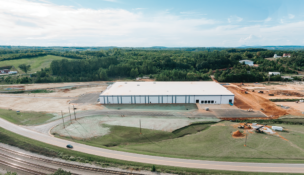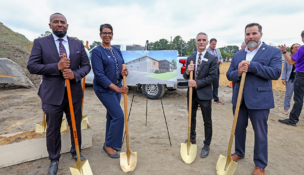High cost, higher rewards
Inflation prompts upgrades for meetings, venues

The Greater Richmond Convention Center has added upgrades including public Wi-Fi access and a new digital sound system, says its general manager, Michael Meyers. Photo by Shandell Taylor

The Greater Richmond Convention Center has added upgrades including public Wi-Fi access and a new digital sound system, says its general manager, Michael Meyers. Photo by Shandell Taylor
High cost, higher rewards
Inflation prompts upgrades for meetings, venues
Michael Meyers is always looking for an advantage.
Like many in the meetings industry, the Greater Richmond Convention Center‘s general manager has seen his facility’s costs spike from inflation.
Likewise, the price tag to run conferences has increased, so planners and venues are striving to ensure a good return on investment for attendees. And to remain an attractive player in the conference-hosting game, you need to evolve your infrastructure and services.
“People want to make sure you’re maintaining your facility, adding technology that can benefit them,” Meyers says.
A late 2022 report from American Express estimated that costs of running conferences and conventions would increase by 1.5% to 3% this year, and price hikes are expected to continue in 2024 — particularly for food and fuel, according to a trend report from Tysons-based event technology provider Cvent.
Costs and budgets are planners’ biggest concerns, with 44% of planners reporting their event budgets will increase in 2024, according to an August survey of 533 meeting planners jointly conducted by Cvent and Northstar Meetings Group.
Since 2020, when the pandemic upended the hospitality industry, many Virginia meeting spaces have made upgrades that can make a difference when planners select venues. And pretty much since COVID vaccines were released in December 2020, meeting planners have been anxiously awaiting a rebound in business travel for conventions and conferences.
One anonymous respondent to the Cvent/Northstar survey said, “I am very concerned with the huge increases in prices of all aspects of accommodations, services, A/V, catering, transportation, all of the ‘destination’ fees, etc. Most of our clients cannot triple their meeting budgets from one year to the next. We’re between a rock and a hard place with future meeting sourcing, negotiations and contracting.”
Fresh coats of paint
Many conference venues have made updates in the past three years, some timed to coincide with an expected post-pandemic boost in business.
The Greater Richmond Convention Center added complimentary public Wi-Fi, fresh paint, new LED lighting and digital signage, a new digital sound system, and a renovated food hall.
The Virginia Beach Convention Center earned LEED recertification in 2021. The Embassy Suites by Hilton Hampton Convention Center received a multimillion-dollar upgrade with renovated rooms for the 295-room hotel — with more than 4,000 square feet of meeting space — next door to the Hampton Roads Convention Center. The National Conference Center in Leesburg received a makeover of its hotel rooms in 2021 and added technological upgrades.
“Cities and properties that have secured the most conventions and meetings have put a lot of effort into making sure they have unique amenities,” says Mike Dietrich, Cvent’s vice president of marketing. “This could mean adding more dynamic/flexible meetings space, state-of-the-art hybrid event technology, offering distinct menus, or even partnering with local vendors to provide customized experiences.”
Another big trend Meyers has noticed: a desire for outdoor meeting spaces. “Whether you build rooftops or host events outside the facility, you can add a little flavor, get folks outside and [avoid] keeping them locked inside for two or three days,” Meyers says. “I think that’s a trend that’s going to continue. Our industry is always looking for ways to add value to our customers.”
Improvements such as these seem to have helped the industry recover after the pandemic.
In its annual summer meetings outlook, Meeting Professionals International (MPI) reported that 52% of respondents have seen business return to pre-pandemic levels. Nearly 80% reported favorable business conditions heading into summer 2023.
“It’s clear that in-person meetings and conferences are steadily increasing in popularity, as people are eager for face-to-face interaction … and to reap the benefits that can only come from in-person meetings,” says Dietrich.
MPI’s summer outlook found that 82% of meeting professionals surveyed viewed live attendance for conferences as a positive, while only 17% viewed virtual attendance positively.
However, virtual options will likely never disappear, so planners must continue providing and growing opportunities for hybrid conference models. Venues raced to increase technology options during the pandemic to meet demand. Those improvements helped the state’s larger venues weather the pandemic’s economic ebbs and flows and allowed them to stand ready to offer hybrid modalities.
Meyers says business has continued to grow at the Greater Richmond Convention Center despite higher costs for convention customers due to inflation.
“It’s the reason why I believe that the industry is coming back strong,” says Meyers. “We’re seeing business quickly rebound, and this year we will be back to pre-pandemic levels with our activity. We’re in a healthy cycle.”
Not every organization has such a sunny outlook for the industry, however. An August report from business intelligence company Morning Consult concluded that business travel “will never return to [a pre-pandemic] normal.” Among its findings: Older business travelers have retired, and younger professionals who have entered the space are more cost-conscious and “in charge of their own booking and planning.”
However, Cvent found that 94% of travel managers felt optimistic about business travel activity. American Express found the return to in-person meetings grew more rapidly this year than many expected, with a stabilization forecast for 2024.
The willingness to invest in upgrades to conference capabilities and hotel offerings has helped Virginia’s meetings and conventions industry rebound in particular, according to Dietrich, who cites the state’s proximity to the nation’s capital and government business.

Convention centers and large meeting spaces across the state are convenient to airports and the Interstate 95 corridor. The Washington, D.C., market, including Northern Virginia — which Cvent ranked 11th for top meeting destinations in 2023 — remains a favorite for conventions due to its plethora of museums and cultural attractions. Visitors spent $30.3 billion in the commonwealth in 2022, an increase of 4.4% from pre-pandemic spending in 2019, according to Virginia Tourism Corp.
Mixing business with fun
Hotel revenues have increased and so have room rates, up 13.7% from 2019, according to a report from Old Dominion University’s Dragas Center for Economic Analysis and Policy.
Northern Virginia’s lodging industry, which has historically been more reliant on business travel than other areas, continues to lag the rest of the state in hotel revenues and is the only region where the industry has not recovered from the pandemic. The region represented about 3.6% less of the state’s overall hotel revenues for July 2023 than in July 2019. Nevertheless, ODU still found Northern Virginia had a 23.8% increase in hotel revenue from 2022 to 2023, with an 8.9% increase in rooms sold.
The state has also benefited from business-leisure travel — aka “bleisure” — Dietrich adds. “Employees are eager to get out and see the world after years of remote work where they were mainly confined to their homes. Now, business travelers are jumping at the opportunity to convert their business trips into mini vacations, adding on some much-needed leisure time to the itinerary.”
Norfolk Convention and Visitors Bureau President and CEO Kurt Krause says he’s noticed a spike in hotel occupancies in the days before and/or after a convention.
“We have good cultural options: the ocean, great museums, the history at Colonial Williamsburg — everything one gas tank away,” says Krause. “People come early or stay later to experience the area, bringing their family along.”
Venues and planners offering robust digital options also are seeing increased interest from audiences, Dietrich says.
By 2025, 80% of B2B sales interactions will occur in digital channels, according to a Cvent study, so venues can capture customers by offering online booking. The percentage of event planners who are more likely to select a location if it offers online booking increased by 33% from 2022 to 2023.
He also has seen increased industry adoption of generative artificial intelligence tools like ChatGPT to create everything from marketing emails to website content to RFP responses for sourcing venues.
Increasingly, planners also are seeking accessible options, Dietrich says. Closed captioning, language translations, and accessible website and registration experiences help reach a more diverse audience.
“Event professionals have continued to leverage technology to not only streamline the planning process but to also bring those digital elements into the in-person event to enhance attendee engagement and enable better event insights,” Dietrich says.
Hiring shortages persist
Meyers got a firsthand view of the state of meetings this summer in Pittsburgh. For the first time since the pandemic, Meyers attended VenueConnect, a conference and trade show for convention venue managers. The sessions featured forward-thinking topics — including multiple sessions on sustainability and diverse workforce recruitment — rather than focusing on rebounding from the pandemic.
But when Meyers and his colleagues gathered on the sidelines between sessions, the topic gravitated toward a significant industry challenge: hiring.
About 50.5 million American workers quit their jobs in 2022, breaking the “Great Resignation” record set in 2021 by 2.2 million, according to data from the U.S. Bureau of Labor Statistics. Many cited factors such as work-life balance, compensation, child care needs and workplace flexibility as factors. Meanwhile, the hospitality and food services industry, already battered by the pandemic, also saw higher quit rates last year than in 2021.
The leisure and hospitality industry added roughly 40,000 jobs in August 2023, an increase of about 8,000 jobs since July, according to federal data. But leisure and hospitality employment is still down 1.7%, or about 290,000 jobs, below February 2020. The industry’s unemployment rate is at 5.8%, among the highest levels of sectors measured by BLS.
“We saw a lot of experienced staff on the meeting planner side and on the venue side decide to leave the industry during the pandemic,” Meyers says. “Now you struggle on the venue side to hire people because this is a tough schedule with working nights and weekends in particular. We have to do some unique things like building better schedules, increasing wages and offering advancement and easing the burden on people who want a work-life balance.”
Dietrich says technology can also ease the sting of worker shortages. “Many hotels have also started to implement direct online booking options that help streamline the booking process, saving time for both event and convention planners and hotel managers,” he says.
Regardless of industry challenges, it hasn’t deterred plans for building new convention hotels and meeting spaces. American Express reported that 59% of its industry forecast respondents predicted there will be an increase in hotel rooms in 2024, with another 58% expecting a growth in meeting space.
Here in Virginia, a pair of hotels with meeting space opened on college campuses in April — The Highlander Hotel Radford and The Forum Hotel at the University of Virginia — and a hotel/conference center with 25,000 square feet of meeting space, the Virginia Guesthouse and Conference Center, is scheduled to open at U.Va. in 2025.
“We are optimistic about the current state of the economy and its outlook,” says Katie Murphy, senior marketing and communications manager for the U.Va. Foundation, which manages the university’s real estate. “Our models were built on a significant amount of university-related business, which gives us confidence in the Virginia Guesthouse’s position and its planned opening in 2025.”
Meanwhile, Meyers notes, Richmond’s city government is evaluating proposals for City Center, a 9.4-acre downtown “innovation district” that would include replacing the shuttered Richmond Coliseum with a hotel tower that could become the tallest building in Richmond. The minimum 500-room hotel would support business at the nearby convention center.
“It’s easier to solve a problem of [room and hotel shortages] when the industry is on an upswing,” Meyers says. “Getting this done [along with other hotels and meeting spaces coming online] will be a big benefit to us, the community and our region to have.”
s

















